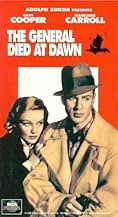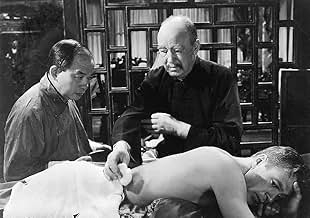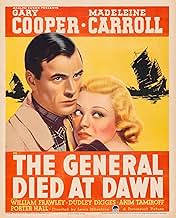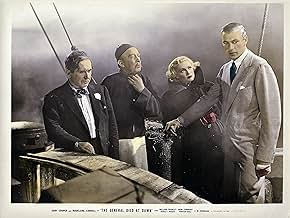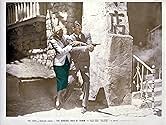IMDb रेटिंग
6.4/10
1.4 हज़ार
आपकी रेटिंग
अपनी भाषा में प्लॉट जोड़ेंAmid the anarchy of China, an American mercenary tangles with a ruthless warlord.Amid the anarchy of China, an American mercenary tangles with a ruthless warlord.Amid the anarchy of China, an American mercenary tangles with a ruthless warlord.
- निर्देशक
- लेखक
- स्टार
- 3 ऑस्कर के लिए नामांकित
- 1 जीत और कुल 3 नामांकन
Lee Tong Foo
- Mr. Chen
- (as Lee Tung-Foo)
Hans Fuerberg
- Yang's Military Advisor
- (as Hans Furberg)
Irene Bennett
- Passenger
- (बिना क्रेडिट के)
Spencer Chan
- Killer
- (बिना क्रेडिट के)
Thomas Chan
- Houseboy
- (बिना क्रेडिट के)
फ़ीचर्ड समीक्षाएं
"The General Died at Dawn" features Gary Cooper in a role similar to the one he played in "For Whom the Bell Tolls" a couple of years later. Directed by Lewis Milestone the movie is visually stunning and exciting. Madeleine Carroll (fresh from her success in Hitchcock's "The 39 Steps")is very good as Cooper's love interest.Akim Tamiroff was nominated for an Oscar as the General.He's certainly a menacing figure here.But I think Philip Ahn as his second in command delivers the best performance.What subtle fanaticism he conveys.The movie is full of interesting twists in the storyline and except for the ending,which I found a bit silly,it is a solid movie.
Between masterworks such as "All Quiet on the Western Front" (1930) and "The Strange Love of Martha Ivers" (1945) the Moldovan born Lewis Milestone had a mixed career. He made a bunch of good movies, a bunch of bad ones, and several bunches of films that have just been forgotten. Somewhere in here we also encounter "The General Died at Dawn" (1936), an interesting adventure film set in China. The film features the first screenplay by Clifford Odets, then one of the hottest playwrights around. Even though the film boasts a charismatic ensemble of actors, it often feels like the real star here is the screenplay.
The movies opens very strong. We are introduced to the plight of the poor Chinese, who struggle against a ruthless warlord General Yang, played by Akim Tamiroff in an Oscar-nominated role. Gary Cooper is our idealist hero, a guy who could never catch an even break, and is now trying to give the Chinese one. Coop is something of a spy, carrying important money shipment to the people fighting Yang, but unfortunately Yang has his own spies and is very much on to him...
I would go as far as to call the first half an hour (or so) of this film a masterpiece. Coop is introduced wonderfully, he has a monkey named Sam as a sidekick, and the whole train sequence, featuring the female lead Madeleine Carroll, and eventually Tamiroff as Yang, is wonderfully written. The suspense of the narrative feels real, but the screenplay also has time to be witty and funny. Cooper gets great lines, and throws a few unexpected (yet so enjoyable) punches around as well. I laughed a bunch and was rooting for the hero, rooting for the film really.
Unfortunately after the first third of the film, the narrative takes several missteps. All the important characters go their different ways for too long of a period, and by the time they are all in the same space again, the film has lost its momentum. The ending is not bad, but it is nothing breathtaking either. The film also runs into some trouble, when it can't quite decide, how it wants to portray General Yang and his men.
Still, I would very much recommend this to fans of classic Hollywood. Cooper gets a really good role as our hero, and Tamiroff is very memorable as Yang. Tamiroff was originally Armenian, so in Hollywood-land, that will have to pass as Chinese. I do, however, seriously wish they hadn't turned poor Dudley Digges into Mr. Wu. That was a bit cringe-worthy.
The movies opens very strong. We are introduced to the plight of the poor Chinese, who struggle against a ruthless warlord General Yang, played by Akim Tamiroff in an Oscar-nominated role. Gary Cooper is our idealist hero, a guy who could never catch an even break, and is now trying to give the Chinese one. Coop is something of a spy, carrying important money shipment to the people fighting Yang, but unfortunately Yang has his own spies and is very much on to him...
I would go as far as to call the first half an hour (or so) of this film a masterpiece. Coop is introduced wonderfully, he has a monkey named Sam as a sidekick, and the whole train sequence, featuring the female lead Madeleine Carroll, and eventually Tamiroff as Yang, is wonderfully written. The suspense of the narrative feels real, but the screenplay also has time to be witty and funny. Cooper gets great lines, and throws a few unexpected (yet so enjoyable) punches around as well. I laughed a bunch and was rooting for the hero, rooting for the film really.
Unfortunately after the first third of the film, the narrative takes several missteps. All the important characters go their different ways for too long of a period, and by the time they are all in the same space again, the film has lost its momentum. The ending is not bad, but it is nothing breathtaking either. The film also runs into some trouble, when it can't quite decide, how it wants to portray General Yang and his men.
Still, I would very much recommend this to fans of classic Hollywood. Cooper gets a really good role as our hero, and Tamiroff is very memorable as Yang. Tamiroff was originally Armenian, so in Hollywood-land, that will have to pass as Chinese. I do, however, seriously wish they hadn't turned poor Dudley Digges into Mr. Wu. That was a bit cringe-worthy.
The scene in the train where femme fatal Judy Perrie seduces O'Hara is a masterpiece of steamy sensuality. Carroll's silky-smooth alabaster skin and flaxen hair, gorgeously highlighted by her exquisitely outlined lips and eyes, were masterfully exploited by director Lewis Milestone and some extremely skilled cameramen, as her feminine delights proved too much for the otherwise unswervingly steadfast O'Hara. Throughout, the curiously uneven script takes a decided turn for the better, with both participants delivering some highly suggestive verbal exchanges, brimming with innuendo and wit, culminating with O'Hara mockingly asking Judie if he can kiss her, only to receive in return the playful reply that he must first ask her mother. He then looks into the neighboring compartment and makes the request in mock earnestness, for there is no Mrs. Perrie! All the while, the sinister war lord General Yang and his dark forces are preparing to intercept the train, "relieve" O'Hara of the funds he's set to deliver to Mr. Wu for the sole purpose of ridding the province of the scurrilous Yang. Let your imaginations soar, esteemed classic film buffs, for this is truly great film-making.
Lewis Milestone is surely one of the most under-appreciated directors from Hollywood's Golden Era. He may be the best example to illustrate how cinematographers and film editors have less to do with how good a movie looks than the director himself. Lewis Milestone's pictures exhibit the same fluid, sensuous, exhilarating black and white cinematography and silky smooth scene changes no matter who his camera man and editor were. The fluid movement of his camera was his trade mark and an innovative style much copied, especially in the 'forties. He is in fact credited with the invention of the camera dolly while filming the early talkie classic All Quiet On The Western Front (1930).
In The General Died At Dawn the gorgeous cinematography finds a worthy subject of concentration in the breath-taking beauty of leading lady Madeleine Carroll, who plays a tormented femme fa-tale, manipulated into wicked and even murderous money-making schemes by her terminally ill and morally challenged father (Porter Hall). When she has to lure idealistic soldier of fortune Gary Cooper into the clutches of cruel, tyrannical Chinese warlord Akim Tamiroff, she quite naturally falls in love with him -- Cooper, not Tamiroff, of course! Miss Carol has never looked lovelier than in this picture. As she reached thirty years of age, a dawning maturity was adding character to her beauty and endowing her gorgeous face with an aching sensuality. Okay, trying to describe what makes a beautiful woman that way is like trying to describe what makes Oreo cookies taste so good. Believe me, Madeleine had it! Not to mention, she was a terrific actress!
When Gary Cooper is on screen, he doesn't have to worry about anyone stealing attention, even a beaut like Madeline Carroll. Tamiroff, who earned an Accademy Award nomination for his role, is bizarrely riveting, as he was in nearly every movie appearance. Good support is also provided by Hall in one of his best performances, Dudley Digges, and William Frawley. Frawley is rather irritating, as in all his roles, but it was intended here.
The plot is confusing at times, and doesn't always make complete sense, but it wasn't so difficult to keep up with as others have carried on. Compared to, say, The Big Sleep (1946), it was as easy to follow as The Three Little Pigs. Whatever the story, Milestone knew how to reel it out in a way that would keep your peepers glued to the screen. This style of suspenseful story-telling immersed in eye-grabbing cinematography would be honed to a fine edge in the next decade with his masterpieces Edge Of Darkness (1943) (see my review) and The Strange Loves of Martha Ivers (1946). In fact this 1936 movie's flowing camera work, oblique angles, frequent night scenes, and dark, brutal story seem to be pointing the way to the stylish noir thrillers of the next decade.
The General Died At Dawn has everything you could ask from a movie -- top stars, exciting action, gorgeous cinematography. Top-notch Old Hollywood entertainment from the smoothest of the smooth, Lewis Milestone!
In The General Died At Dawn the gorgeous cinematography finds a worthy subject of concentration in the breath-taking beauty of leading lady Madeleine Carroll, who plays a tormented femme fa-tale, manipulated into wicked and even murderous money-making schemes by her terminally ill and morally challenged father (Porter Hall). When she has to lure idealistic soldier of fortune Gary Cooper into the clutches of cruel, tyrannical Chinese warlord Akim Tamiroff, she quite naturally falls in love with him -- Cooper, not Tamiroff, of course! Miss Carol has never looked lovelier than in this picture. As she reached thirty years of age, a dawning maturity was adding character to her beauty and endowing her gorgeous face with an aching sensuality. Okay, trying to describe what makes a beautiful woman that way is like trying to describe what makes Oreo cookies taste so good. Believe me, Madeleine had it! Not to mention, she was a terrific actress!
When Gary Cooper is on screen, he doesn't have to worry about anyone stealing attention, even a beaut like Madeline Carroll. Tamiroff, who earned an Accademy Award nomination for his role, is bizarrely riveting, as he was in nearly every movie appearance. Good support is also provided by Hall in one of his best performances, Dudley Digges, and William Frawley. Frawley is rather irritating, as in all his roles, but it was intended here.
The plot is confusing at times, and doesn't always make complete sense, but it wasn't so difficult to keep up with as others have carried on. Compared to, say, The Big Sleep (1946), it was as easy to follow as The Three Little Pigs. Whatever the story, Milestone knew how to reel it out in a way that would keep your peepers glued to the screen. This style of suspenseful story-telling immersed in eye-grabbing cinematography would be honed to a fine edge in the next decade with his masterpieces Edge Of Darkness (1943) (see my review) and The Strange Loves of Martha Ivers (1946). In fact this 1936 movie's flowing camera work, oblique angles, frequent night scenes, and dark, brutal story seem to be pointing the way to the stylish noir thrillers of the next decade.
The General Died At Dawn has everything you could ask from a movie -- top stars, exciting action, gorgeous cinematography. Top-notch Old Hollywood entertainment from the smoothest of the smooth, Lewis Milestone!
O'Hara (Gary Cooper) is on a mission to deliver money to Mr Wu (Dudley Digges) so that Mr Wu can buy weapons from Brighton (William Frawley) in his struggle against the Chinese warlord General Yang (Akim Tamiroff). However, he is betrayed by Judy Perrie (Madeleine Carroll) and her father Peter Perrie (Porter Hall) and is captured by Yang on a train. He hands over the money and is taken hostage but escapes and determines to get the money back.......
This film is pretty confusing and you have to pay attention to keep up. It still loses you in parts, though, especially at the beginning. The cast are nothing special and fall in between the extremes of Akim Tamiroff who is excellent as the warlord and William Frawley who is dreadful in every scene that he appears in. Frawley also has an awful, raspy-throat voice which really invades your brain. He manages to produce a very offensive performance and it doesn't help the film at all.
The story confuses at the beginning, then levels out into semi-tedium with unbelievability factor 10. The way in which Cooper breezes through the film with his cocky manner is pure phoniness (he would have been killed at his first meeting with Yang). The plot is also somewhat cheapened by the way that General Yang meets his death. Frawley's involvement in the final denouement is an outrageous con to those who are looking forward to a good climax.
The film is done in such a way as to preach to the viewer and this stand of taking the moral high ground insults the audience...........Shut up, Cooper!!..... There is also some really crass dialogue in the love scenes. Overall, the film is a let-down.
This film is pretty confusing and you have to pay attention to keep up. It still loses you in parts, though, especially at the beginning. The cast are nothing special and fall in between the extremes of Akim Tamiroff who is excellent as the warlord and William Frawley who is dreadful in every scene that he appears in. Frawley also has an awful, raspy-throat voice which really invades your brain. He manages to produce a very offensive performance and it doesn't help the film at all.
The story confuses at the beginning, then levels out into semi-tedium with unbelievability factor 10. The way in which Cooper breezes through the film with his cocky manner is pure phoniness (he would have been killed at his first meeting with Yang). The plot is also somewhat cheapened by the way that General Yang meets his death. Frawley's involvement in the final denouement is an outrageous con to those who are looking forward to a good climax.
The film is done in such a way as to preach to the viewer and this stand of taking the moral high ground insults the audience...........Shut up, Cooper!!..... There is also some really crass dialogue in the love scenes. Overall, the film is a let-down.
क्या आपको पता है
- ट्रिवियाThe main character, O'Hara, is based on the real-life adventurer Morris "Two-Gun" Cohen (1887-1970). Born in Poland to a Jewish family, Cohen grew up in the tough streets of London's East End. As a teenager, he moved to western Canada and became a ranch hand and gambler in Saskatchewan, and later a highly successful real-estate agent in Alberta. During World War I he fought in Europe with the Canadian Railway Troops. His friendship with Chinese workers on the Canadian-Pacific Railroad prompted him to go to China in the 1920s. After negotiating a railroad deal with Dr. Yat-sen Sun, Cohen became a personal bodyguard to Sun and a trainer of Sun's private army. After Sun's death in 1925, Cohen ran guns for various Chinese warlords throughout the 1930s. When the Japanese invaded China in 1937, Cohen continued to supply Chinese resistance forces with arms and served with the British SOE. In 1941, following the fall of Hong Kong, he was captured by the Japanese and put in a prison camp, but was traded to the English in 1943 in a rare prisoner exchange. After the war, Cohen continued to operate in China as an agent for various British firms, including Rolls-Royce and Decca Radar. His former dealings with Chinese warlords kept him in good standing with Chinese Communist officials until his death in 1970.
- गूफ़While arguing with Peter, Judy slams a book down on the desk. A couple of other books on the corner of the desk disappear in a later scene.
- क्रेज़ी क्रेडिटThe opening credits all appear on the sails of boats.
- कनेक्शनFeatured in Red Hollywood (1996)
टॉप पसंद
रेटिंग देने के लिए साइन-इन करें और वैयक्तिकृत सुझावों के लिए वॉचलिस्ट करें
- How long is The General Died at Dawn?Alexa द्वारा संचालित
विवरण
- चलने की अवधि1 घंटा 38 मिनट
- रंग
- पक्ष अनुपात
- 1.37 : 1
इस पेज में योगदान दें
किसी बदलाव का सुझाव दें या अनुपलब्ध कॉन्टेंट जोड़ें

टॉप गैप
By what name was The General Died at Dawn (1936) officially released in India in English?
जवाब
